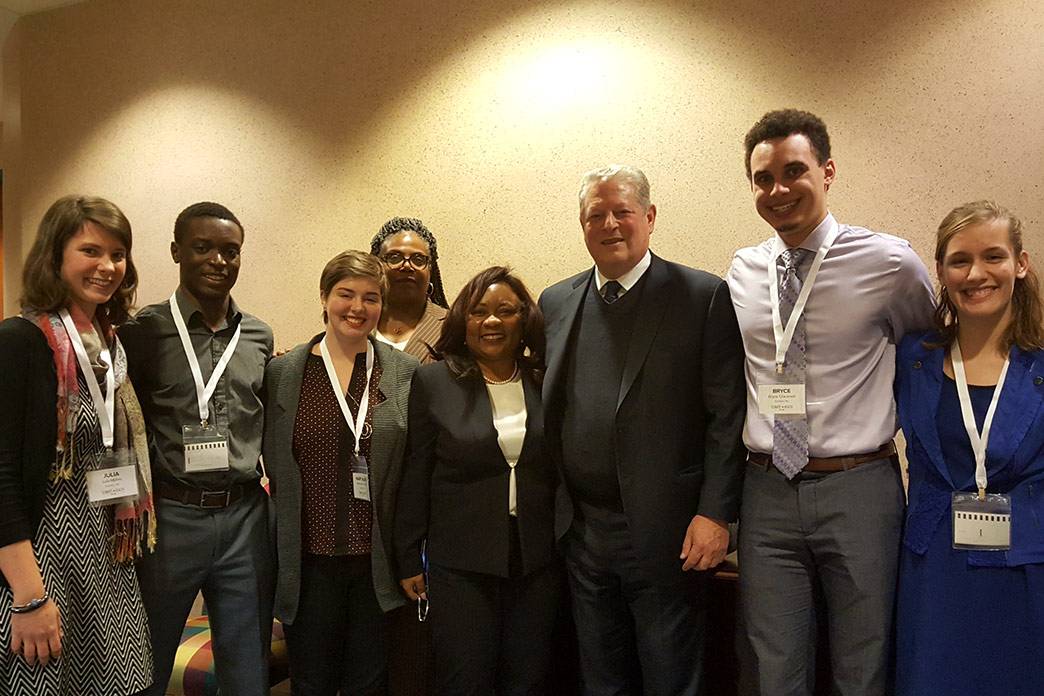From Lowndes County, A Connection Between Environmental Activism and Civil Rights
FHI Practitioner in Residence works with students on environmental justice studies

Catherine Flowers, the 2017 Franklin Humanities Institute Practitioner in Residence, is an internationally recognized advocate for the human right to water and sanitation. As executive director and founder of the Alabama Center for Rural Enterprise (ACRE), Flowers promotes participatory community development projects to improve infrastructure and quality of life in poor, rural communities in Alabama.
Flowers’ residency is just the latest in a variety of projects she conducted with Duke students. In February, she invited a cohort of Duke students to attend a meeting on climate change and health, initially sponsored by the Centers for Disease Control but later organized by a group including former Vice President Al Gore after the CDC cancelled it. (Read thoughts by Duke students on the conference here.)
This interview with Catherine Flowers was conducted over email by Kyra Josephson, a junior undergraduate student, majoring in history and working for the Duke Human Rights Center at the Franklin Humanities Institute.
Kyra Josephson: How did you become interested in environmental justice? How do you view the connection between environmental justice and human rights?
Catherine Flowers: I have always been a lover of the natural world growing up in rural Lowndes County. As I grew up I wondered why birds and wildlife died when the crop dusters sprayed nearby crops. It also made me wonder how it impacted people. Why were certain communities impacted and others were not? And why were all of the people impacted generally poor or minorities? And should all humans have the right to clean air, clean water and live free of contamination? That is the connection between human rights and environmental justice in my view.
KJ: Your work with ACRE focuses specifically on Lowndes County, Alabama. What are the most pressing issues involving environmental justice and human rights in Lowndes County?
CF: The United Nations recognized the Human Right to Sanitation in 2010. In Lowndes County many of the residents do not have access to sanitation. When I began this work more than 15 years ago, I thought that it was just in Lowndes County. Now I realize that Lowndes County is symbolic of poor rural communities across the United States that are experiencing the same injustice.
KJ: What other communities in the United States are facing similar issues?
CF: The communities are too numerous to name. However, it is a problem in all 67 counties in Alabama. It is also in Virginia, West Virginia, Alaska, Texas, North Carolina, South Carolina, Georgia, Mississippi, Louisiana, Texas, Alaska, California, Arizona and many other states.
KJ: Why do you think it is important for students to become involved in environmental justice?
CF: Students should be involved in environmental justice because it is an intersection of human rights and climate justice. Eventually the injustice that is found in poor and frontline communities will impact all of us. As it rains more often and we all deal with deluges that causes flooding, it increases the problems on many levels. Correcting the problems in frontline communities can help us learn about resilience and sustainability.
KJ: What can students do to work on issues of poverty, race, sanitation, and lack of infrastructure?
CF: Students can use their invaluable skills to help document the problems, do research on solutions, give voice to impacted communities, organize against injustices and propose policies.
KJ: What are challenges that activists face and how have you overcome them?
CF: There is no simple answer to this question. The challenges faced depends on the communities and regions in which the activists are operating. However, I think it is very important to listen to and include in the solution people who are directly impacted by the problem. Be prepared for a struggle. It is never easy. Know what success looks like. There are different levels of success. Celebrate milestones. Also know that change is not a sprint but a marathon. You may never see the results of your efforts. Plant seeds that will benefit the generations to come.
Read more about Catherine Flowers in this interview.